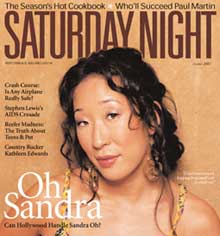
Mordecai Richler was a Canadian writer. His best known works are The Apprenticeship of Duddy Kravitz (1959) and Barney's Version (1997). His 1970 novel St. Urbain's Horseman and 1989 novel Solomon Gursky Was Here were nominated for the Booker Prize. He is also well known for the Jacob Two-Two fantasy series for children. In addition to his fiction, Richler wrote numerous essays about the Jewish community in Canada, and about Canadian and Quebec nationalism. Richler's Oh Canada! Oh Quebec! (1992), a collection of essays about nationalism and anti-Semitism, generated considerable controversy.

The National Post is a Canadian English-language broadsheet newspaper and the flagship publication of Postmedia Network. It is published Mondays through Saturdays, with Monday released as a digital e-edition only. The newspaper is distributed in the provinces of Ontario, Quebec, Alberta and British Columbia. Weekend editions of the newspaper are also distributed in Manitoba and Saskatchewan.
Robert Marshall Blount Fulford is a Canadian journalist, magazine editor, and essayist. He lives in Toronto, Ontario.

Maclean's, founded in 1905, is a Canadian news magazine reporting on Canadian issues such as politics, pop culture, and current events. Its founder, publisher John Bayne Maclean, established the magazine to provide a uniquely Canadian perspective on current affairs and to "entertain but also inspire its readers". Rogers Media, the magazine's publisher since 1994, announced in September 2016 that Maclean's would become a monthly beginning January 2017, while continuing to produce a weekly issue on the Texture app. In 2019, the magazine was bought by its current publisher, St. Joseph Communications.
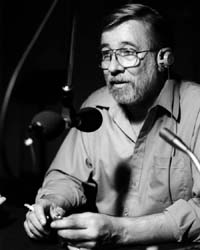
Peter John Gzowski, known colloquially as "Mr. Canada", or "Captain Canada", was a Canadian broadcaster, writer and reporter, most famous for his work on the CBC radio shows This Country in the Morning and Morningside. His first biographer argued that Gzowski's contribution to Canadian media must be considered in the context of efforts by a generation of Canadian nationalists to understand and express Canada's cultural identity. Gzowski wrote books, hosted television shows, and worked at a number of newspapers and at Maclean's magazine. Gzowski was known for a friendly, warm, interviewing style.

McClelland & Stewart Limited is a Canadian publishing company. It is owned by Penguin Random House of Canada, a branch of Penguin Random House, the international book publishing division of German media giant Bertelsmann.
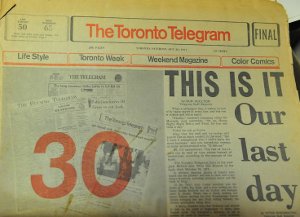
The Toronto Evening Telegram was a conservative, broadsheet afternoon newspaper published in Toronto from 1876 to 1971. It had a reputation for supporting the Conservative Party at the federal and the provincial levels. The paper competed with a newspaper supporting the Liberal Party of Ontario: The Toronto Star. The Telegram strongly supported Canada's connection with the United Kingdom and the rest of the British Empire as late as the 1960s.

The Financial Post is a financial news website, and business section of the National Post, both publications of the Postmedia Network. It started as an English Canadian business newspaper, which published from 1907 to 1998. In 1998, the publication was folded into the new National Post. The name Financial Post also lives on in the Post's monthly business magazine, Financial Post Business.

The Calgary Herald is a daily newspaper published in Calgary, Alberta, Canada. Publication began in 1883 as The Calgary Herald, Mining and Ranche Advocate, and General Advertiser. It is owned by the Postmedia Network.
Zsuzsi Gartner is a Canadian author and journalist. She regularly writes for The Globe and Mail, the Vancouver Sun, Quill & Quire, Canadian Business, and Western Living.
John Anderson Fraser is a Canadian journalist, writer and academic. He served as Master of Massey College in the University of Toronto from 1995 until his retirement in June 2014. He is currently the executive chair of the National NewsMedia Council of Canada.
The Tamarack Review was a Canadian literary magazine, published from 1956 to 1982. Established and edited by Robert Weaver, other figures associated with the magazine's editorial staff included Anne Wilkinson, William Toye and John Robert Colombo. In addition, Ivon Maclean Owen was among the founding editors. During the early years of the magazine, there was also an editorial advisory board made up of F.R. Scott, A.J.M. Smith, James Reaney, Alan Crawley, and George Woodcock. The magazine was published on a quarterly basis and had its headquarters in Toronto.
John Edward Macfarlane was the editor of the Canadian magazine The Walrus from 2008 to 2014. He previously served as editor of Toronto Life from 1992 to 2007.

The Gazette, also known as the Montreal Gazette, is a Canadian English-language broadsheet daily newspaper which is owned by Postmedia Network. It is published in Montreal, Quebec, Canada.
Jacob Richler is a Canadian newspaper and magazine journalist, and the son of novelist Mordecai Richler and Florence Isabel (Wood). He was the inspiration for his father's Jacob Two-Two trilogy of children's books.
Noah Richler is a Canadian author, journalist, and broadcaster who was raised in Montreal, Quebec, Canada and London, England. He is the son of Canadian novelist Mordecai Richler.
The Star Weekly magazine was a Canadian periodical published from 1910 until 1973. The publication was read widely in rural Canada where delivery of daily newspapers was infrequent.
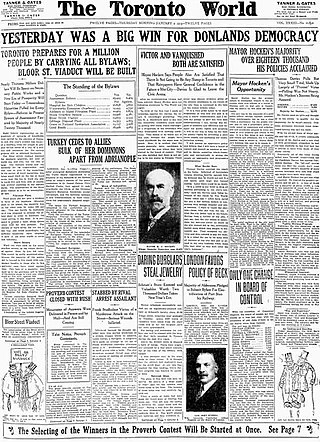
The Toronto World was a newspaper based in Toronto, Ontario, Canada. It existed between 1880 and 1921, and a Sunday edition operated from 1891 to 1924. Founded by William Findlay "Billy" Maclean, it was popular among Toronto's working class and similar in style to The New York Herald. It was said to be the "editorially boldest" of the Toronto press, and was notable for its irreverence, noisy exposés of civic corruption, skilful skirting of the libel laws, and opposition to the religious establishment. Journalists such as Hector Charlesworth, Joseph E. Atkinson and John Bayne Maclean first worked there, before moving on to senior positions at other publications.
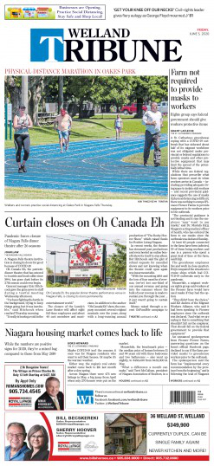
The Welland Tribune is a daily newspaper that services Welland, Ontario and surrounding area. The Tribune was one of several Postmedia Network newspapers purchased by Torstar in a transaction between the two companies which concluded on November 27, 2017. The paper continues to be published by the Metroland Media Group subsidiary of Torstar. In late May 2020, Torstar accepted an offer for the sale of all of its assets to Nordstar Capital in late May 2020, a deal expected to close by year end.
Ron Graham is a Canadian author and journalist.
